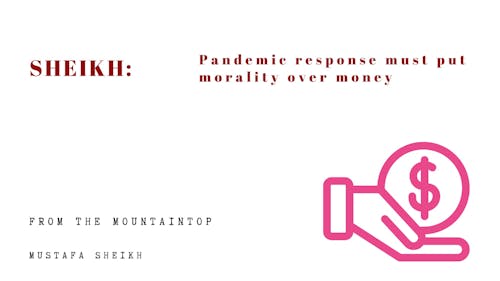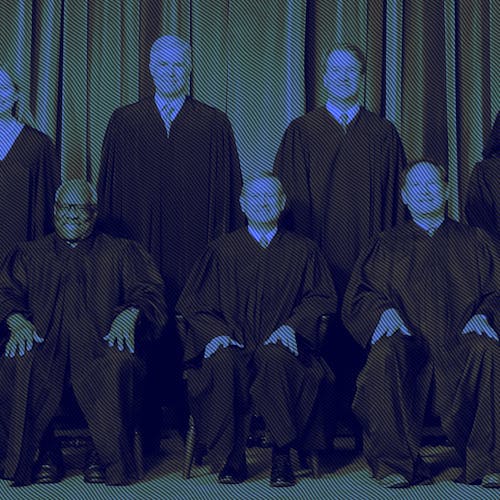SHEIKH: Pandemic response must put morality over money

As a matter of successful advocacy, it has become habit to make the ethos argument. In a capitalist society, advocacy often boils down to arguments around impacts. The successful arguments usually have dollar signs in them.
For example, diversity hires have been mocked, pushed against and discredited in the national discourse and in policy. Affirmative action, as a policy, has taken a very long time to become an accepted practice, yet I would not be surprised if it was taken off the books tomorrow.
Boston Consulting Group reports that companies with above average levels of diversity in their leadership have 19 percent higher revenues, on average, than those that are below average.
That is a reason for diverse management, and it is not one to ignore. It should be a matter of pride that minority groups outperform those who were historically in leadership positions. That still should not be the sole argument, though. Members of historically disenfranchised groups deserve to be held up to the same standards as the rest because that is how generational wealth and connections are built.
There are quite a few reasons to distribute opportunities equally. It is natural for businessmen and women to focus on the financial arguments. Once it is proven that a policy is profitable, it is simply more likely to succeed with people who live by the profit motive. It is only fair that people make hiring decisions on their own. Autonomy in these decisions is essential to making progress cumulative rather than transitory.
Prevention versus treatment is another conversation in which money becomes the winning argument. The Centers for Disease Control and Prevention, in a booklet called "The Power of Prevention," tells us that for every dollar in school tobacco prevention programs, $20 worth of future medical costs is saved. Preventing the pain of lung cancer should be more important than the cost of treating lung cancer.
The qualitative benefit per person of a few extra years of life and improved quality of life, in my view, should be the driving argument for prevention. We can prevent people from developing awful, painful diseases, so how come this is not the winning argument?
This tactic is part of the conversation on increasing the minimum wage as well. Resorting to financial arguments when advocating for policies that help people is not something that is unique to any one conversation.
The working poor rate for the U.S. labor force is 4.5 percent. The working poor are people who are below the poverty line despite being employed (for more than 27 weeks). The defining argument here should be that the employed should not ever suffer poverty. Having an employer should mean that one's basic needs are fulfilled, no matter what level or industry.
The winning argument for increasing the minimum wage is about marginal propensity to consume. If a dollar is given to a billionaire, their chance of spending it soon is low. The billionaire's expenses are handled, there is nothing that they particularly need, so that dollar given to them will not stimulate the economy much. If that same dollar were given to a person below the poverty line, they are very likely to spend it, which leads to economic benefit.
Individuals have their own value systems. They also have to take care of themselves, and usually others. So there are not many people who are going to go out of their way to adopt a habit or make a choice on the basis of moral argument. Incentives work. Incentives are the basis for economics.
If trying to make opportunities more available to immigrants, women or people of color, then the argument that they improve the management team and improve revenues is likely a winning one. If trying to prevent awful diseases from developing in individuals in a population, the argument that the disease costs more than the preventative measure is probably going to convince the people who write checks. If trying to get more money for the people who work jobs and still sit below the poverty level, then gross domestic product arguments will probably win.
Advocates choose these issues and dedicate themselves to change because they care about the people affected. Advocacy only makes sense when it is advocating for people. The money is a side benefit. Improving lives is the point of equal opportunity, of prevention and of changing labor policy.
So when states consider repealing stay-at-home orders in the middle of a pandemic, the habit of making financial arguments to convince people to make moral decisions becomes a liability. The downside of choosing money over people repeatedly is that when lives are on the line, the default is to choose money. Georgia's stay-at-home order expires today. South Carolina and Tennessee are making the same choice: Start reopening the state.
Social distancing is about people, stay-at-home orders are for saving lives. Repealing the policies that help healthcare workers and their patients through a crisis is horrific. Making these choices for money is unconscionable. Productivity is important, progress is important, maintaining the functioning of our society is admirable. But, health comes first. Safety comes first. The moral argument here has to win, because this conversation is about a pandemic.
Mustafa Sheikh is a School of Arts and Sciences junior majoring in public health. His column, "From the Mountaintop," runs on alternate Thursdays.
*Columns,cartoons and letters do not necessarily reflect the views of the Targum Publishing Company or its staff.
YOUR VOICE|The Daily Targum welcomes submissions from all readers. Due to space limitations in our print newspaper, letters to the editor must not exceed 500 words. Guest columns and commentaries must be between 700 and 850 words. All authors must include their name, phone number, class year and college affiliation or department to be considered for publication. Please submit via email to oped@dailytargum.com by 4 p.m. to be considered for the following day's publication. Columns, cartoons and letters do not necessarily reflect the views of the Targum Publishing Company or its staff.



